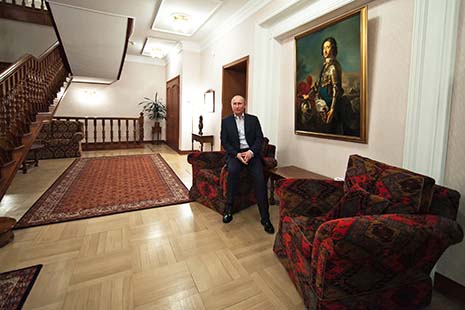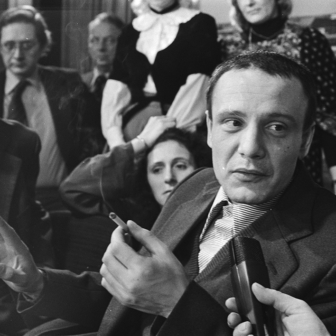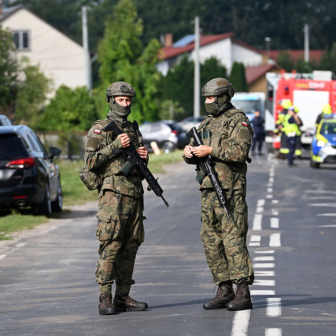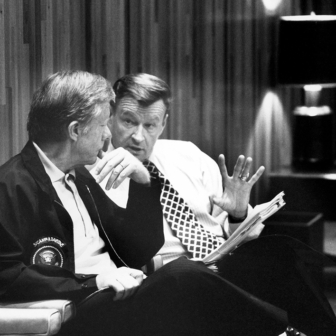THE standard narrative about the last year and a half in Russian politics runs roughly as follows. In late 2011, Putin and his ruling United Russia Party’s ratings were sliding. The fact that the party performed poorly at the December 2011 parliamentary elections was a shock, though not wholly unexpected. But the largely spontaneous popular demonstrations against the falsification of the results gave Putin a seriously bad fright. Until he managed to engineer himself a win in the first round of the presidential elections the following March, he was very much on edge. The tears in his eyes on election night bore eloquent witness to the strain he’d been under.
Since then, however, Putin has recovered his usual confidence and belligerence. He has charted a course towards increasing repression at home and increasing assertiveness abroad, displaying particular venom towards the United States. The opposition has largely subsided and failed to press home any advantage it ever had. Putin is securely in the saddle for the next six years, until 2018, and possibly for twelve. We should prepare for more of the same.
The standard narrative isn’t necessarily wrong, but important qualifications need to be made. Though the strength of Putin’s position shouldn’t be underestimated, as oppositionists tend to do, it is less stable than it looks, and certainly less stable than it once was.
Putin’s legitimacy has been seriously damaged, and the chorus of criticism on the internet and in the remaining independent media is shrill. The urban middle classes are disheartened but also quite deeply alienated. Efforts at creating a coherent opposition leadership have had only modest success, and numbers at demonstrations are down, but when an issue does mobilise people, the opposition can still get a crowd out on the streets. (In January this year, for instance, over 50,000 marched “against the scoundrels” over the banning of adoptions of Russian children by US citizens.)
Opposition is taking various forms, typically via the internet, and can sometimes draw blood. Anti-corruption campaigner Alexei Navalny’s current campaign of exposing prominent hardliners in the parliament for offences against Putin’s new strictures on property ownership by officials has demoralised the ruling party and led to a spate of resignations.
An opposition campaign is also being launched online against the widespread practice within the Russian elite of acquiring academic decorations by resort to ghost-writers and plagiarism. The opposition has already claimed some scalps and reportedly has something like twenty “investigations” in train. This trend is the more threatening because Putin himself is vulnerable on this count. Much less flagrant cases of plagiarism than seem to be common in Russia have led to ministerial resignations in Germany, a comparison commentators are making.
Although the Russian economy looks pretty solid compared to much of Europe, it is underperforming for a country with such a huge resource endowment. In the last quarter of 2012, growth slipped to the equivalent of an annual rate of 2 per cent. Cyprus permitting, that rate will probably recover somewhat in the course of 2013, but the current trend rate of between 3 and 4 per cent compares very unfavourably with rates of around 7 per cent during Putin’s previous terms as president.
To win re-election, Putin promised everything to everyone, placing a heavy and long-term burden on the state budget. The oil price at which the Russian budget breaks even had already been rising rapidly and has now reached $117 a barrel. And there are looming threats to Russia’s dominant position in energy export markets from US shale gas, for example, and from the death of Hugo Chavez.
While Putin’s “power vertical” – his consolidation of centralised power in the Russian state – came together well enough to see off the immediate challenge from political opponents, there are signs of instability within the elite that Putin’s actions are accentuating. Hardline factions, to which Putin has always been closer, are tending to escape control in the way they did during the period before he handed the presidency to Medvedev in 2008. The elite as a whole has moved to the silovik (securocrat) right and there may be challenges from that quarter.
The neo-Stalinist tendency within the elite is quite strong and has an able and popular potential leader in Dmitry Rogozin, the combative former ambassador to NATO. Recalled to Moscow last year, Rogozin is now a highly visible deputy prime minister responsible for the defence-industrial complex. He has called for a renewed wave of military industrialisation – as in the Soviet Union in the 1930s – claiming implausibly that this could revitalise the entire manufacturing sector. He also supports renaming Volgograd as Stalingrad, and – perhaps attempting to outshine Navalny – has called for severe punishment for anyone found to be involved in corrupt activities. This populist platform has considerable appeal to much of the elite and the general population
Even the occasionally excessive zeal of the United Russia deputies in the Duma seems to be causing Putin some anguish. While the Kremlin has undoubtedly initiated the many legislative attacks of recent months on the opposition, some of the new laws have risked becoming caricatural in the hands of Duma zealots eager to please the leadership. Putin initially tried to moderate their proposed total ban on US adoptions, for example, and rubbed some of the harsh edges off their draft laws prohibiting Russian officials from owning property or bank accounts abroad. But this, too, was a Putin initiative aimed at curbing the tendency of the Russian elite to denounce the West for domestic political purposes while owning property, schooling their children and in general disporting themselves in Western countries.
Another clear sign of dog-fighting under the carpet is the public struggle by conservative forces within the regime against the government of prime minister Dmitry Medvedev. Putin has himself been openly critical of the government, and the attacks by conservative media sources have been frequent and abusive. Although liberals have tended to gather around Medvedev as prime minister, he is an even weaker reed in that role than he was as president. Putin is making costly demands – for huge military expenditure and the further concentration of energy industries at huge expense in the hands of his de facto number two, Rosneft chair Igor Sechin, for example – and it is left to Medvedev and his government to square any resulting fiscal circles.
This particular form of intra-elite instability may not be of long duration. Putin can easily turn Medvedev into a scapegoat to be sacked at any time of his choosing. In the meantime, Medvedev is being treated with contempt in public by the siloviki, including via an online documentary accusing him of weakness in capitulating to the West over Libya.
A similar, earlier video showed former senior military officers denouncing him for alleged indecision just before the outset of the Georgia war in 2008 while praising Putin, then prime minister, for having demanded more resolute action. While backbiting and policy squabbles have never been entirely absent from Putin’s rule, these are unusually public and explicit expressions of the tensions.
The fact that Medvedev is under such heavy attack may be more than just a reflection of his unpopularity with the dominant siloviki and their hostility towards his government’s policies. As prime minister, Medvedev would be in constitutional line to act as president should Putin die or be incapacitated. The rumours swirling in late 2012 that Putin may be suffering a potentially debilitating injury or illness evoked speculation about possible succession scenarios, and may explain some of the urgency in hardline attempts to tip Medvedev out of his prime minister’s chair.
Putin has always been a practitioner of what was known in Brezhnev’s time as “stability of cadres.” Bureaucrats in autocratic systems do not appreciate constant sackings and other such disruptions, much preferring to get on with feathering their nests undisturbed. And this they have been able to do spectacularly well under Putin, their numbers multiplying as well as their rapacity. But with the opposition scoring telling points by exposing their corruption, Putin now feels he must be seen to act, at least symbolically. Hence the strictures against members of the elite living a double life, denouncing the West at home while enjoying its fleshpots at every opportunity. These new rigours have been termed Putin’s “nationalisation of the elite.”
Putin’s drive to repatriate elite assets from Western boltholes has multiple targets. It is meant to stave off opposition attacks on “swindlers and thieves”; to increase the leadership’s purchase on its sometimes unresponsive bureaucracy by making an example of some of them; to reduce exposure to malign Western influences and reduce the West’s capacity to punish the regime by using selective sanctions against top officials of the kind launched under the US Magnitsky Act; and to address the burning issue of capital flight from Russia to Western destinations.
A particularly striking example of this capital flight, an unknown but not insubstantial proportion of which is illegal or downright money-laundering, is the vast flow of funds from Russia to Cyprus and back again. Bizarrely, that tax-haven (population 800,000) is responsible for about a quarter of foreign investment in Russia, and itself attracts about a quarter of Russian investment abroad. While most of this financial round-tripping involves at least tax evasion, some observers believe that what’s mainly involved is the need Russian investors feel to escape the dismal investment climate in their own country.
The European Union’s decision that the solution for Cyprus’s banking crisis should include a compulsory contribution from the wealthiest of its account-holders will certainly hit Russians and Russia hard. The angry protests from Putin and Medvedev are likely to be supported by many Russians, including people who would normally be on the other side of the barricades. Led by Germany, the decision is both an opportunity and a costly blow for Moscow. With more plausibility than usual, Putin can blame the West for nefarious conspiracies to damage mother Russia. And it gives an unexpected fillip to his campaign to repatriate Russian capital to the homeland where he can more readily get access to it for his own patriotic plans.
But being forced to put their often dubious earnings where their patriotic mouths are will stir great resentment in the elite. To make things worse, Putin also seems inclined to inflict collective punishment on the United Russia party as a whole for its poor performance, shifting his support instead to the All-Russian National Front, which he set up to support the regime in the parliamentary/presidential election cycle of 2011–12. There is even speculation that Putin may dissolve parliament to help purge and punish the hapless United Russia. These are all uncharacteristically risky manoeuvres for Putin, suggesting that, for whatever reasons, he is agitated about the current state of affairs in Russia.
THE turbulence within the elite, which he is exacerbating, may make it more difficult for Putin to continue to maintain his role as the arbiter of last resort between the different factions. But he has always been closer by background and temperament to the Petersburg siloviki than the Petersburg tsiviliki (civilian lawyers and economists) who together form the core of his elite support. Despite presiding over a country with some of the greatest socio-economic inequalities in the world, he continues to pretend, quite successfully, to be a man of the people, a champion of the working class, a resolute supporter of the Russian military and patriots generally, and a determined adversary of the petty-bourgeois Russian intelligentsia.
Simultaneously, he manages to present himself as a social conservative, a devout Orthodox church-goer, and the scourge of unpopular minorities, including (sotto voce) Muslims and also pushy sexual minorities. (Internationally he has even managed to market himself successfully to Hugo Chavez and other latter-day state socialists as their like-minded ally.) These representational skills, which owe something to his KGB training, have been in prominent display in his fightback against the street protests of 2011–12.
Putin’s crackdown on the opposition was initially tempered by the fading liberal gestures of Medvedev’s last lamer-duck months as president. But since Putin returned to the presidency formally in May 2012, the tempo has increased sharply. With impetuous speed the Duma has passed a series of harsh new laws that create or extend criminal offences and provide for draconian fines and, often, prison terms. This takes Russia back to a level of repression not seen since before Gorbachev’s perestroika. These new laws:
• penalise those who organise or participate in “unauthorised’ demonstrations
• require all organisations that receive any foreign money to proclaim themselves “foreign agents”
• ban anyone holding foreign citizenship from working in an NGO in Russia or expressing views that are damaging to Russia’s interests
• recriminalise “slander,” which was decriminalised by Medvedev a few months earlier
• propose a new offence of insulting religious feelings (the law is still under consideration in the parliament
• expand the criminal offence of treason
• place restrictions on freedom of expression on the internet, ostensibly to protect minors (with more restrictions apparently under consideration).
A number of further such measures have been proposed in the Duma, most xenophobic and some bizarre, like the suggestion from the Duma’s longstanding resident buffoon, Vladimir Zhirinovsky, that foreign words be banned from use in Russian media, and a proposal that cinemas be penalised for showing too many foreign films.
Many leading opposition figures have been singled out for dawn raids on their apartments, indicted for offences carrying heavy penalties, or subjected to character assassination in television “documentaries”. And reports suggest a big legal case is being mounted against twenty or so demonstrators involved in the Bolotnoye Delo (Muddy Field case), which arose out of a demonstration on 6 May last year, just before Putin’s inauguration.
In the view of most independent observers, the physical confrontation that broke out that day was the result of provocation by police. Last week, a man claiming to have been a secret government operative surfaced on You Tube asserting that he had been offered money to cause an outbreak of violence at the demonstration. Regardless of the plausibility of the witness or his story, it does seem clear that the regime intends to use the event to prosecute and jail a significant number of alleged offenders.
So far, the regime has not been pursuing many of the new police-state laws with much vigour. They are very repressive on paper, but their implementation remains more consistent with the soft authoritarianism that has characterised Putin’s rule to date.
Many of the putative offenders, particularly the better-known ones, have still not been locked up, and some continue to defy the regime. Despite facing multiple charges that could attract lengthy sentences, Navalny has been particularly active. (The charges look very thin, but conviction rates in Russian courts are close to 100 per cent even in non-political cases.)
Will Putin now tighten the screws and make an example of some of these “offenders”? The Muddy Field case and the raids in recent weeks on hundred of NGOs suggest that the repression may be now starting to gather momentum. But tightening the screws would be risky, and not just in terms of Russia’s “reputation deficit”. A few martyrs might re-energise and refocus the opposition.
More heavy-handed tactics, on the other hand, might cow the critics, but at the cost of causing an exodus of talent that Russia can ill afford. Surveys have long pointed to high percentages of younger urban Russians wishing to leave the country, and in recent months emigration has again become a buzz word among the creative classes.
But in another sense Putin’s repressive measures have been more carefully and skilfully managed than their hasty adoption and their repugnance to a Western sensibility might suggest. From the outset of the protests, he sought to identify himself with the ordinary person out in the sticks, for whom these intelligentishki pooncing about in the capital had little appeal. He seized on one such salt-of-the-earth type, an industrial foreman in Siberia called Igor Kholmanskikh, as the epitome of this healthy core of society. During a TV call-in program in December 2011, he had offered to bring some mates to Moscow to help Putin sort out the arty types on the streets. Kholmanskikh was rewarded soon after for his sturdy good sense by being made the polpred (presidential representative) to Eastern Siberia, a job for which he appeared to have only very modest qualifications.
At Putin’s first big press conference after the elections in December 2011, he compared the white ribbons worn as symbols by the protestors to condoms. And he didn’t refrained from hinting that the protestors were sexual deviants of some kind. The aim was evidently to accentuate divisions in society, often drawing on the mass propaganda and ideologised education of Soviet times.
To make sure a wedge was driven between the urban middle-class protestors and the ordinary people, opposition leaders were presented as wealthy and corrupt, with even Navalny the volunteer scourge of official corruption being depicted – as corrupt. In a moment of inspiration during an online interview, Navalny had coined the phrase “the party of swindlers and thieves,” a phrase which cost United Russia heavily in the December 2011 elections and has haunted it ever since.
Navalny’s low ratings in public opinion polling suggest the counter-attack, however crude, has been effective. In any European country with free media and a mature democracy this tactic would hardly have worked, but it does still in Russia. From this point of view, the Pussy Riot trial was a gift to the regime, as were any efforts by opposition figures to try to prevent the victimisation of homosexuals, against whom a repressive campaign has also been conducted with growing intensity.
The Kremlin studies the Russian public’s attitudes very closely and knows how to target its conservatism. Opinion polling frequently appears to demonstrate that this or that repressive measure undertaken by the regime is wildly popular with a majority of respondents. While the timing and methodology of such enquiries may at times be dubious, it would seem that Putin’s tactics are effective. In short, he has developed a set of policies with which a transplanted Pauline Hanson would be more than happy.
Nina Andreyeva (the putative author of an article in Sovyetskaya Rossiya in 1988 denouncing perestroika) would probably also be pleased with Putin’s denunciation of the United States for bribing the demonstrators and funding monitors who cast doubt on the honesty of the elections.
She would be even happier with Putin’s efforts to discreetly restore “balance” to the official assessment of Stalin and rewrite school history textbooks to preclude undue emphasis on such difficulties as purges, concentration camps and mass starvation. In February, the independent public opinion polling organisation Levada published results of surveys showing that the number of people who see Stalin in a positive light has increased very significantly on Putin’s watch, and is now almost 50 per cent of the population.
If – to take a counter-factual scenario – a postwar Nazi government in a residual Third Reich, led by ex-intelligence officers from the Nazi era, were to have influenced public attitudes in the Reich to Hitler in a similar way, we’d all be extremely alarmed.
AFTER the street demonstrations of 2011–12, the Kremlin launched a strident campaign against their “reset” partners in the United States, starting with a campaign of harassment of the reset’s key architect, the then incoming US ambassador Mike McFaul, and continuing through to its extreme reaction to the Magnitsky Act.
The hasty passage in a highly patriotic atmosphere of Herod’s Law, as it has been called, banning any adoptions of Russian children by American parents, featured bizarre statements by some deputies. These included the assertion that the United States wanted Russian children in order to harvest their organs for resale or to use them as cannon fodder in a future war against Russia.
What all this points to is the fact that, while Russian foreign policy is undoubtedly the product of many factors, it is currently being shaped substantially and at times decisively by domestic politics and by the mindsets, phobias and propaganda tactics of the people who dominate it.
The combination of increasingly repressive policies, adroitly selective use of left-wing rhetoric and appeals to the public’s conservative mindset seems to be working well for now. But some opinion surveys suggest that Putin’s popularity is slipping again quite markedly (though no alternative to him is in sight). And the domestic political situation is certainly less stable than it was before Putin and Medvedev swapped jobs in September 2011. The urban middle classes are unhappy, the economy is more fragile, and the balance between intra-regime factions is more tenuous, in considerable measure as a result of Putin’s own actions.
To complicate matters further, the ever-present threat of militant Islamism concentrated in the North Caucasus continues to bubble along, with a disturbing tendency to metastasise to areas not previously much affected, notably the Central Volga regions of Tatarstan and Bashkortostan. Keeping all these factors under control till 2018 and beyond will be a challenge.
Although Putin’s repressive domestic policies and strident external policies will probably be maintained, and possibly strengthened, there are some important exceptions to this general picture. In some areas of domestic policy, for instance – in macroeconomic policy in particular, which has been in competent and responsible hands and whose importance Putin recognises – good sense will continue to prevail.
But it would be surprising if that competence and good sense were allowed to extend in any serious way towards tackling corruption (in which the regime is heavily implicated), improving the dismal investment climate or reducing the inefficient gigantomania of favoured economic enterprises, whether state or private. The recent prominence of Putin’s neo-Soviet economic adviser, Sergei Glazyev, and the pronouncements of Putin and Rogozin on the need for a massive 1930s-style defence-led industrialisation suggest that the effectiveness and independence of the key economic policy makers may just possibly come under threat.
The stridency of external policies could also be checked by signs of progress in relations with the United States and the European Union. If, for example, Washington were indeed to offer greater flexibility on missile defence (as Obama audibly promised Medvedev at the Seoul nuclear summit last March), Moscow may tone down its rhetoric somewhat.
But even that may be too much to hope for. While for reasons that are not yet fully clear, Moscow has muted somewhat its denunciations of the EU-imposed bailout, the fallout from Cyprus is likely to further inflame relations with the European Union. And when Defense Secretary Hagel announced on 15 March that Washington would not be proceeding with stage four of its proposed European missile defence shield (a feature of the plans the Russians had particularly objected to), the reflex action from senior Russian spokesmen was immediately and overwhelmingly negative. If the Putin regime hangs on, whether under Putin or, for example, his old ex-KGB colleague Sergei Ivanov, it could be a tough twelve years for East–West relations. •




